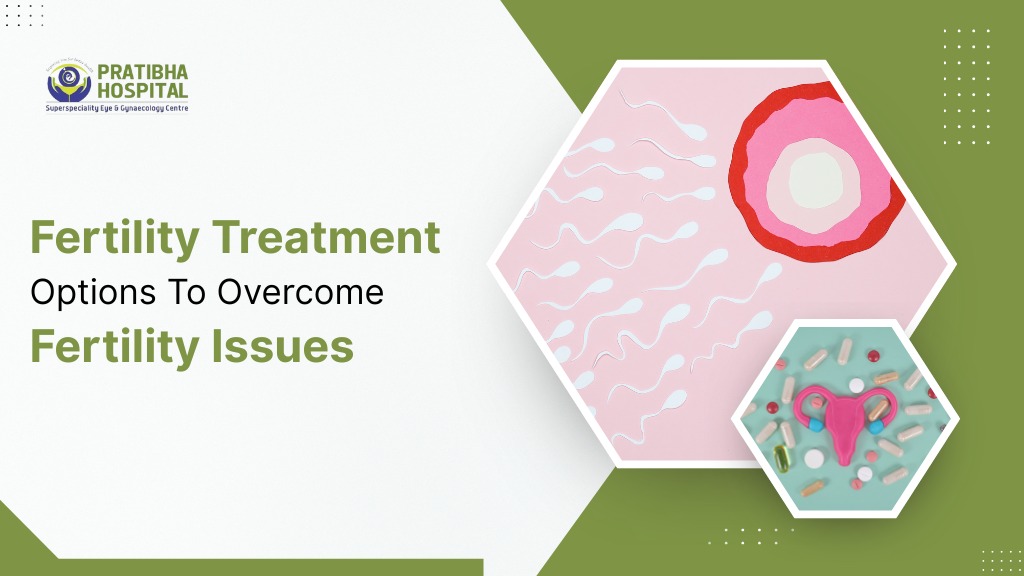Fertility Treatment Options To Overcome Fertility Issues
Dealing with infertility affects not just your health but also your emotional well-being. However, understanding the range of fertility treatment options and exploring the infertility causes and solutions can offer clarity and hope. Whether the concern lies with ovulation problems, sperm quality, or unexplained infertility, today’s medical advancements provide a variety of treatments to address individual needs.

From lifestyle changes and medication to assisted reproductive techniques like IVF and IUI, informed decisions begin with the right knowledge. This blog aims to guide you through the basics of infertility and available treatments in a clear, helpful manner—free from promotional language or bias.
Understanding Infertility: Causes And Solutions
Dealing with infertility affects not just your health but also your emotional well-being.
The inability to get pregnant may be linked to health concerns in either the husband or the wife.
Causes in Women:
- Ovulatory disorders such as PCOS
- Blocked fallopian tubes
- Endometriosis
- Uterine abnormalities
- Age-related egg decline
Causes in Men:
- Low sperm count or poor sperm motility
- Hormonal imbalances
- Varicocele
- Previous infections or injuries
- Lifestyle factors (smoking, alcohol, obesity)
Identifying the root cause is essential before considering specific fertility treatment options.
Overview Of Fertility Treatment Options
Medical advancements have expanded the range of available treatments, many of which can address both mild and complex cases of infertility.
1. Ovulation Induction
For women struggling with irregular or absent periods, the primary treatment often involves stimulating ovulation. You take medicines that help your ovaries produce and release eggs.
This approach increases the chances of fertilization through natural intimacy or with medical assistance. Regular monitoring by a fertility specialist ensures optimal timing and safety, helping manage side effects and adjusting dosages as needed.
2. Intrauterine Insemination (IUI)
IUI is a procedure in which specially prepared sperm is directly inserted into a woman’s uterus during her ovulation period. This enhances the likelihood of sperm successfully reaching the egg, particularly in situations of mild male fertility concerns, cervical mucus problems, or cases with no clear cause of infertility.
The process is relatively quick, minimally invasive, and often combined with ovulation-inducing medications for better results. It’s a suitable and commonly recommended option before considering more advanced treatments like IVF.
3. In Vitro Fertilization (IVF)
IVF is a widely used and effective method. Eggs are taken from the ovaries, fertilized outside the body, and the embryo is then introduced into the mother’s womb.

It is particularly helpful for tubal issues, male-related fertility concerns, or cases where the cause remains unknown. Individuals in regions like Jalgaon may explore various local clinics offering IVF services.
4. Donor Sperm or Eggs
When one partner is unable to produce healthy eggs or sperm, donor gametes may be used as part of the fertility treatment process. This option is commonly chosen in cases involving age-related fertility decline, genetic disorders, or repeated IVF failures.
Donor sperm or eggs undergo thorough screening, and the treatment is carried out with proper medical and legal protocols to ensure safety and ethical practice.
5. Surgical Interventions
Surgical treatments like laparoscopy or hysteroscopy are often recommended when structural abnormalities in the reproductive organs affect fertility. These procedures help diagnose and treat conditions such as uterine fibroids, polyps, adhesions, or blocked fallopian tubes.
By correcting these issues, the likelihood of natural conception may significantly improve without requiring immediate recourse to assisted reproductive technologies.
6. Lifestyle Adjustments
Often overlooked, lifestyle changes can significantly impact fertility. Weight management, proper nutrition, regular exercise, and avoiding substances like tobacco or alcohol can improve reproductive health. Handling stress and mental health are key factors as well.
When To Seek Medical Advice
Seeing a fertility doctor might be the right step when:
- Pregnancy has not occurred after 12 months of trying (6 months if over 35)
- Menstrual cycles are irregular or absent
- There have been multiple miscarriages
- A medical history suggests possible fertility problems
Prompt evaluation can help identify treatable conditions and guide individuals toward appropriate infertility causes and solutions.
Fertility Services In Jalgaon
For residents of Jalgaon, seeking consultation at a reliable IVF centre in Jalgaon can provide access to basic and advanced fertility evaluations. While this blog does not endorse specific clinics, it’s important to choose a centre that provides transparent communication, licensed practitioners, and evidence-based approaches.
Also read: How To Boost Your Fertility For A Successful Pregnancy
Conclusion
Fertility challenges can arise from a wide variety of causes, but many are treatable. With access to accurate information and medical advancements, this helps individuals can take confident steps regarding their reproductive choices. Understanding fertility treatment options and working with healthcare professionals can significantly improve the chances of conception.
If you’re looking for answers, getting checked by a doctor can help clarify what’s going on. The sooner the problem is identified and managed, the better the results can be. Remember, the goal is to support you in making informed moves toward building a family with certainty and peace of mind.






